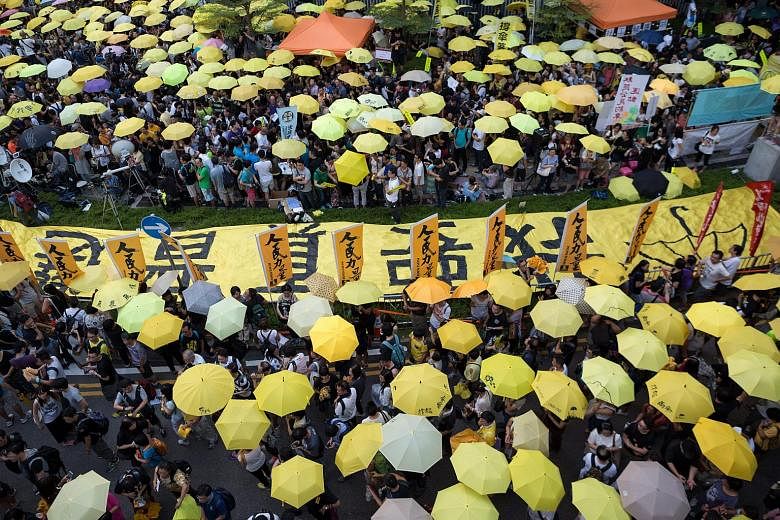HONG KONG (Reuters) - A leading pro-Beijing politician in Hong Kong said future leaders of the global financial hub face a grim prospect unless lawmakers and Beijing end their impasse over political reform.
Lawmakers in the Chinese-controlled city recently vetoed a proposal to hold public elections for Hong Kong's top political leader, the chief executive, after China insisted that only pre-screened, pro-Beijing candidates be allowed to stand.
That veto had followed months of pro-democracy protests that shut down major roads and posed one of the biggest challenges to China's Communist Party leadership in decades. "If you don't change the system, you can only expect similar people to take the post in the coming years and they will be faced with the same problems," Mr Jasper Tsang, the president of Hong Kong's legislative council and founder of its largest pro-Beijing party, said in an interview with Reuters.
The comments come after former chief executive Donald Tsang was charged on Oct 5 with misconduct.
Tsang is one of three chief executives to have run Hong Kong since Britain handed the city back to Chinese rule in 1997, and all three have proved unpopular, underscoring Beijing's struggle to find a credible and acceptable leader for the former colony.
"It will be even more difficult for the chief executive in 2017 to establish a minimum degree of legitimacy," Mr Tsang said, calling the prospects for that person "gloomy" and "grim".
The next chief executive is due to be chosen in 2017. "We must be able to break the vicious circle... A weak government makes it very difficult for the bureaucrats, for the officials to really achieve and win respect from the public."
Mr Tsang said Beijing's proposal to move towards full democracy in stages showed that it was sensitive to dissatisfaction at governance in the city. However, it was important to avoid a"revolution" by jumping from the old colonial system to free elections, he added.
He did not offer specific ideas for a compromise between Beijing and Hong Kong's democrats.
Britain returned Hong Kong to China under a "one country, two systems" deal which aimed to ensure that the city's freedoms and independent judiciary would remain for 50 years.
In a major embarrassment for Beijing, Hong Kong's legislative council in June vetoed its conditions for universal suffrage. That means the chief executive will be again selected in 2017 without a popular vote.
The post is critical to Beijing's rule over the city and its stated desire for stability and harmony. China's Communist Party leaders need someone they can trust, but also someone who can win local support and manage the city's increasingly antagonistic relationship with the mainland.
"Beijing is worried about Hong Kong's destabilising potential, its embarrassment potential," said Dr Simon Young, a law professor and associate research dean at the University of Hong Kong. "It's probably one of the world's most difficult jobs."
Those differences were highlighted last month when Beijing's chief Hong Kong representative, traditionally a low-key figure, sparked controversy by saying the chief executive was above the local judiciary and legislature.
Veteran Hong Kong political and constitutional experts say the situation could work if a leader could keep Beijing's trust while openly lobbying on behalf of the city, something none of Hong Kong's three post-colonial leaders has managed.
The first, Mr Tung Chee Hwa, quit during his second term after more than 500,000 people took to the streets to protest against a proposed anti-sedition law among other grievances.
Mr Tsang, the church-going son of a policeman who was knighted for public service under the British colonial administration, retired from office in 2012. He was charged this month with misconduct in public office over a rental deal for a penthouse flat he rented in Shenzhen, southern China.
While he avoided bloodshed, current chief executive Leung Chun Ying presided over the biggest civil unrest since 1960s. For 79 days last year, pro-democracy activists occupied downtown Hong Kong to press Beijing for full democracy.
Mr Leung has faced widespread calls to resign and democratic lawmakers have also demanded an anti-graft investigation into US$6.4 million (S$8.9 million) in business payments he received after assuming office. He has denied any wrongdoing.

